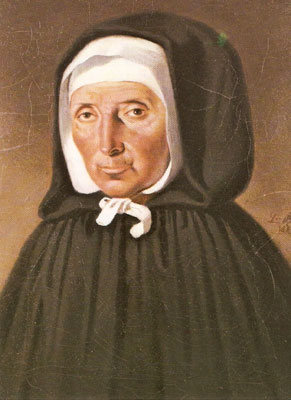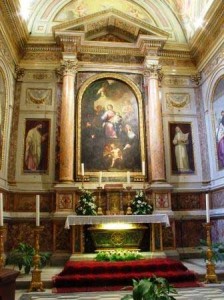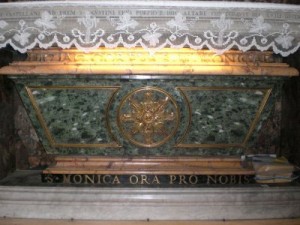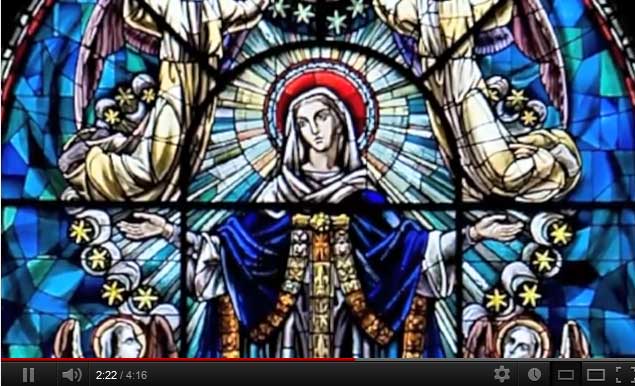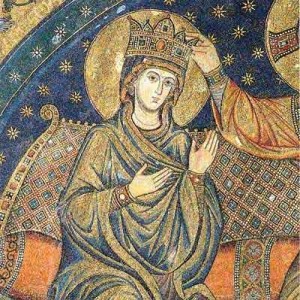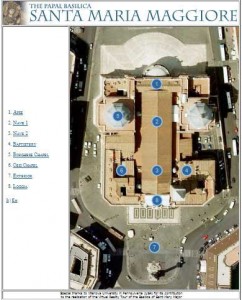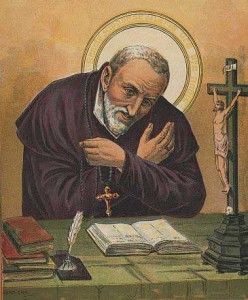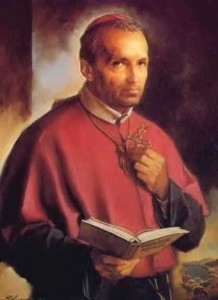 On this the feast day of Blessed Teresa of Calcutta:
On this the feast day of Blessed Teresa of Calcutta:
The Fruit of Prayer
The fruit of silence is prayer
the fruit of prayer is faith
the fruit of faith is love
the fruit of love is service
the fruit of service is peace.
If We Pray
If we pray, we will believe;
If we believe, we will love
If we love, we will serve.
Love to pray
Feel often during the day the need for prayer and pray.
Prayer opens the heart, till it is capable of containing God himself.
Ask and seek and your heart will be big enough to receive Him
and keep Him as Your Own.
Tags: blessed mother teresa of calcutta, missionaries of charity
This entry was posted on Wednesday, September 5th, 2012 at 12:13 am
You can follow any responses to this entry through the RSS 2.0 feed.
A quote from St. Jeanne Jugan:
“Go and find him when your patience and strength run out and you feel alone and helpless. Jesus is waiting for you in the chapel. Say to him, ‘Jesus, you know exactly what is going on. You are all I have, and you know all things. Come to my help.’ And then go, and don’t worry about how you are going to manage. That you have told God about it is enough. He has a good memory.”
A white martyrdom, of sorts, was given to this humble beautiful saint…her story is one of the most compelling I’ve ever heard. Â The fruit of obedience and humility is sainthood. Here’s her story:
From Catholicfounders.org
In 1837 Jeanne Jugan and two companions decided to move into a two-room apartment on Center Street and lead a life of prayer and dedication to God. Jeanne had always been sensitive to the things of God, and she saw him reflected in the numberless faces of the poor of France.
One day she encountered Anne Chauvin, a blind old widow with no one to look after her, and decided to bring her home. Since the apartment was on the second floor, Jeanne had to physically carry her up the narrow stairs. Jeanne gave her bed to Anne and moved into the loft.
Before long she took in another old woman, and Jeanne and her two companions had to work to support and feed themselves and two others. They would often stay up late at night mending and washing clothes and get up early each morning to care for the women in their charge.
Often on Sundays the three of them would go for a walk together along the seashore, stopping at a favorite cleft in the rocks to talk about God, their lives, and their plans for the future. (more…)
Tags: little sisters of the poor, st. jeanne jugan
This entry was posted on Thursday, August 30th, 2012 at 7:30 am
You can follow any responses to this entry through the RSS 2.0 feed.
The importance of his life and contribution to the Church cannot be overstated. St. Augustine, one of the greatest of the Church Fathers, has not only influenced the Church, but the thought of the world as we know it. The story of his conversion as chronicled in his “Confessions”, would be 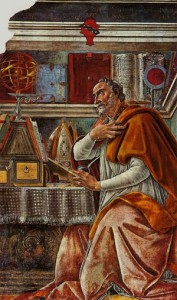 enough, but then add the body of his theological work and you have nothing less than a glimpse of what is truly the power of “grace and mercy”.
enough, but then add the body of his theological work and you have nothing less than a glimpse of what is truly the power of “grace and mercy”.
Mike Aquilina is one of the best at bringing this great saint’s life into perspective.
For a more detail accounting of St. Augustine’s  life, you can visit Lives of the Saints
Spiritual Writings:
-Â ConfessionsÂ
-Â Letters
-Â City of God
-Â Christian Doctrine
-Â On the Holy Trinity
-Â The Enchiridion
-Â On the Catechising of the Uninstructed
-Â On Faith and the Creed
-Â Concerning Faith of Things Not Seen
-Â On the Profit of Believing
-Â On the Creed: A Sermon to Catechumens
-Â On Continence
-Â On the Good of Marriage
-Â On Holy Virginity
-Â On the Good of Widowhood
-Â On Lying
-Â To Consentius: Against Lying
-Â On the Work of Monks
-Â On Patience
-Â On Care to be Had For the Dead
-Â On the Morals of the Catholic Church
-Â On the Morals of the Manichaeans
-Â On Two Souls, Against the Manichaeans
-Â Acts or Disputation Against Fortunatus the Manichaean
-Â Against the Epistle of Manichaeus Called Fundamental
-Â Reply to Faustus the Manichaean
-Â Concerning the Nature of Good, Against the Manichaeans
-Â On Baptism, Against the Donatists
-Â Answer to Letters of Petilian, Bishop of Cirta
-Â Merits and Remission of Sin, and Infant Baptism
-Â On the Spirit and the Letter
-Â On Nature and Grace
-Â On Man’s Perfection in Righteousness
-Â On the Proceedings of Pelagius
-Â On the Grace of Christ, and on Original Sin
-Â On Marriage and Concupiscence
-Â On the Soul and its Origin
-Â Against Two Letters of the Pelagians
-Â On Grace and Free Will
-Â On Rebuke and Grace
-Â The Predestination of the Saints/Gift of Perseverance
-Â Our Lord’s Sermon on the Mount
-Â The Harmony of the Gospels
-Â Sermons on Selected Lessons of the New Testament
-Â Tractates on the Gospel of John
-Â Homilies on the First Epistle of John
-Â Soliloquies
-Â The Enarrations, or Expositions, on the Psalms
For me, out of all the St. Augustine’s work, this is the piece that deeply touches my heart and is one of my all-time favorite prayers:
Late Have I Loved You
A Prayer of Saint Augustine
Late have I loved you, O Beauty, so ancient and so new, late have I loved you!
And behold, you were within me and I was outside, and there I sought for you, and in my deformity I rushed headlong into the well-formed things that you have made.
You were with me, and I was not with you. Those outer beauties held me far from you, yet if they had not been in you, they would not have existed at all.
You called, and cried out to me and broke open my deafness; you shone forth upon me and you scattered my blindness.
You breathed fragrance, and I drew in my breath and I now pant for you.
I tasted, and I hunger and thirst; you touched me, and I burned for your peace.
This prayer is from his book, “Confessions.”
                         Â
Tags: confessions, conversion, fathers mike, grace and mercy, mike aquilina, our sunday visitor, prayer, st augustine
This entry was posted on Tuesday, August 28th, 2012 at 12:22 am
You can follow any responses to this entry through the RSS 2.0 feed.
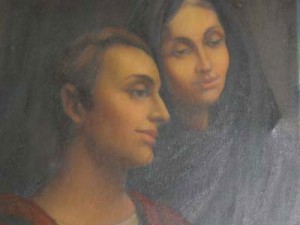 St. Monica (331-387) a “shining light of Christ” example of perserverance in prayer! We have her as an outstanding model of never giving up…what a gift to us! Today we can turn to her and see what sticking to it can do, but did you ever think, “Who was her example?” She didn’t know how the story of her son, St. Augustine would turn out. She didn’t know that he would be transformed by grace into one of the greatest Doctors of the Church  who ever lived. Monica must have become frustrated, and at times filled with anxiety and maybe even  a degree of despair, but she persevered through it all! She surely suffered emotionally for her lost son, but she never gave up her hope in God and faith in His promises…the energy of her love for her son fueled her prayer and grace transformed his seeking heart. It took 30 years, but it happened.
St. Monica (331-387) a “shining light of Christ” example of perserverance in prayer! We have her as an outstanding model of never giving up…what a gift to us! Today we can turn to her and see what sticking to it can do, but did you ever think, “Who was her example?” She didn’t know how the story of her son, St. Augustine would turn out. She didn’t know that he would be transformed by grace into one of the greatest Doctors of the Church  who ever lived. Monica must have become frustrated, and at times filled with anxiety and maybe even  a degree of despair, but she persevered through it all! She surely suffered emotionally for her lost son, but she never gave up her hope in God and faith in His promises…the energy of her love for her son fueled her prayer and grace transformed his seeking heart. It took 30 years, but it happened.
A few months after his conversion, Augustine, Monica and Adeodatus (her other son), set out to return to Africa, but Monica died at Ostia, the ancient port city of Rome, and she was buried there. Some pictures show her so old, but when you think of it, she was only 56 when she died. Augustine was so deeply moved by his mother’s death that he was inspired to write his Confessions, “So be fulfilled what my mother desired of me–more richly in the prayers of so many gained for her through these confessions of mine than by my prayers alone” (Book IX.13.37)
An account of Monica’s early life, her childhood, marriage, her final days and her death, is given in Confessions Book IX, 8-12. He expresses his gratitude for her life:
“I will not speak of her gifts, but of thy gift in her; for she neither made herself nor trained herself. Thou didst create her, and neither her father nor her mother knew what kind of being was to come forth from them. And it was the rod of thy Christ, the discipline of thy only Son, that trained her in thy fear, in the house of one of thy faithful ones who was a sound member of thy Church” (IX.8.7).
Centuries later, Monica’s body was brought to Rome, and eventually her relics were interred in a chapel left of the high altar of the Church of St. Augustine in Rome (see below).
Tags: catholic, catholic podcast, catholic prayer, cathollc spirituality, confessions, conversion, prayer, relics, st augustine, st monica
This entry was posted on Monday, August 27th, 2012 at 12:14 am
You can follow any responses to this entry through the RSS 2.0 feed.
Fr. James Kubicki, the director of the Apostleship of Prayer, Â shares insights of the Queenship of Mary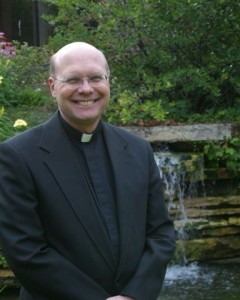
Tags: apostleship of prayer, blessed virgin mary, James Kubicki
This entry was posted on Wednesday, August 22nd, 2012 at 12:57 am
You can follow any responses to this entry through the RSS 2.0 feed.
Gregorian hymn chant of Roman Catholic Christian Church in honour of Mary, Mother of God. It is also a common prayer to the Virgin Mary; usually recited at the end of the rosary.
Tags: chant, prayer, rosary, virgin mary
This entry was posted on Wednesday, August 22nd, 2012 at 12:06 am
You can follow any responses to this entry through the RSS 2.0 feed.
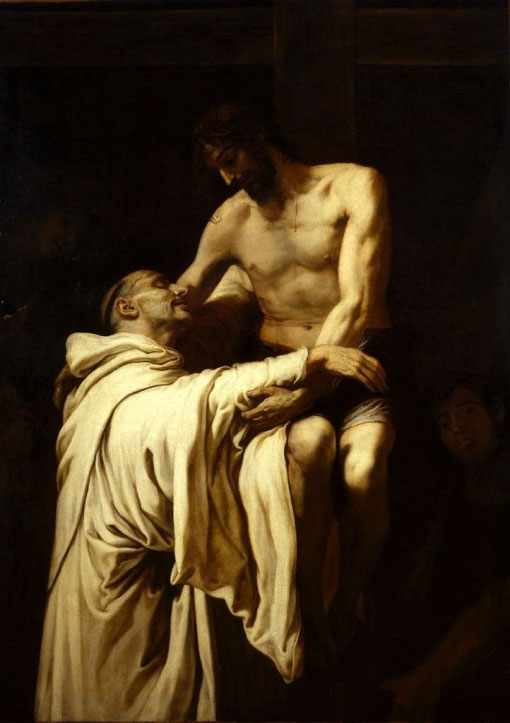 St. Bernard of Clairvaux, a great mystical doctor of the Church. What a heart for Jesus and the Blessed Virgin (I’m sure he still has).
St. Bernard of Clairvaux, a great mystical doctor of the Church. What a heart for Jesus and the Blessed Virgin (I’m sure he still has).
That is curiosity.
That is vanity.
–
That is love.”
St. Bernard of Clairvaux, was a Cisterian monk, who lived in France in the 12th century. Living at a time when the great gothic cathedrals where born, St. Bernard, advocated for simplicity and austerity in life. He was concerned about the temptations of worldly things and desires. He wished to focus solely on the love of Christ and the Blessed Mother; everything else was folly.
To read more about the details of his life you can visit here.
What captures my heart is his legacy of prayer and spiritual writings. He truly deserves the title Doctor of the Church. What a feast he has left us! Pope John Paul II has said that if we wish to learn to pray, look to the Mystical Doctors…he truly is one of those special souls. There is so much, where can one begin? Begin with Mary. Ask the Blessed Mother, she will lead you through his teachings.
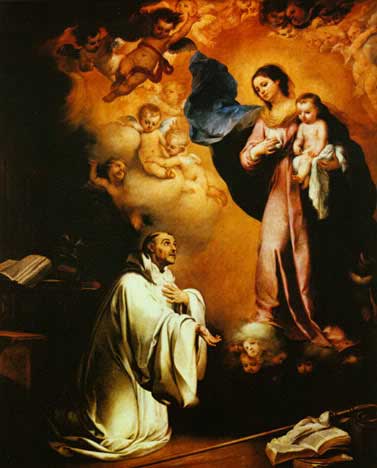 St. Bernard of Clairvaux composed the famous prayer to the Most Blessed Virgin Mary known as The Memorare
St. Bernard of Clairvaux composed the famous prayer to the Most Blessed Virgin Mary known as The Memorare
REMEMBER, O most gracious Virgin Mary, that never was it known that anyone who fled to thy protection, implored thy help, or sought thy intercession was left unaided. Inspired with this confidence, I fly to thee, O Virgin of virgins, my Mother; to thee do I come; before thee I stand, sinful and sorrowful. O Mother of the Word Incarnate, despise not my petitions, but in thy mercy hear and answer me. Amen.
St. Bernard on the Blessed Mother
St. Bernard on Holy Repentance
–
Highly recommended reading introduction to St. Bernard would be – “The Fulfillment of All Desire” by Ralph Martin
–
Tags: blessed mother, blessed virgin mary, Church, discerning heart, doctor of the church, emmaus road, holy repentance, intercession, love, monastic life, mystic, mystic of the Church, ralph martin, st bernard of clairvaux
This entry was posted on Monday, August 20th, 2012 at 12:40 am
You can follow any responses to this entry through the RSS 2.0 feed.
Tags: ave maria
This entry was posted on Wednesday, August 15th, 2012 at 11:31 pm
You can follow any responses to this entry through the RSS 2.0 feed.
From the Merriam-Webster on-line dictionary: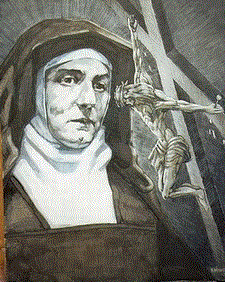
Main Entry: 1mar·tyr
Pronunciation: \ˈmär-tər\
Function: noun
Etymology: Middle English, from Old English, from Late Latin, from Greek martyr-, martys witness
Date: before 12th century
1 : a person who voluntarily suffers death as the penalty of witnessing to and refusing to renounce a religion
2 : a person who sacrifices something of great value and especially life itself for the sake of principle
On this day, August 9, 1942,
Sr. Teresa Benedicta of the Cross (Edith Stein) became a martyr for the faith in the Auschwitz death camp. She continues to witness today.
Tags: auschwitz death camp, carmelite, edith stein, witness
This entry was posted on Thursday, August 9th, 2012 at 6:57 am
You can follow any responses to this entry through the RSS 2.0 feed.
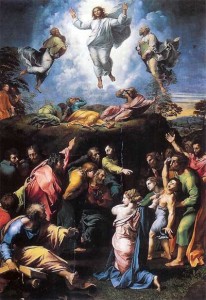 I’ve heard it said that every Orthodox Christian home is encouraged to have an image of the Transfiguration. It’s such a powerful moment.
I’ve heard it said that every Orthodox Christian home is encouraged to have an image of the Transfiguration. It’s such a powerful moment.
The video below is from  Sufjan Stevens. His song, called  “The Transfiguration”, is put to famous works of art. Sufjan is very different in his styling. I find him very intriguing.  You’ll find it different then the big Verdi-like orchestral “sacred” setting you may be expecting on this day.  This piece of Sufjan’s music makes me stretch. And in some ways, wasn’t that the purpose of the day anyway? Expect the unexpected…
Tags: feast of the transfiguration, Jesus, orthodox christian, sufjan stevens
This entry was posted on Monday, August 6th, 2012 at 12:40 am
You can follow any responses to this entry through the RSS 2.0 feed.
Just click and
take a vitual tour of
St. Mary Major
From Rome Reports:
Rome is in a festive mood with a special celebration at Saint Mary Major, one of the four most important basilicas of the Eternal City.
Pope Benedict XVI referred to this unique event in Rome during his General Audience held in Castel Gandolfo.
BENEDICT XVI
Today, where we remember the dedication of the Basilica of Saint Mary Major, the liturgy invites us turn our gaze to Mary, Mother of Christ. Always look to Her, dear young people, following her example in faithfully carry out God’s will. ”But the Basilica itself has also been celebrating this day with the traditional “snow” of rose petals recalling the events around the appearance of the Blessed Mother to Pope Liberius showing him where to build the new Church.
The morning after this dream, on August 5 in the year 358, a miraculous snowfall appeared on the Esquiline Hill of Rome – despite it being mid-summer. Here is where the great basilica stands now.
Since then, the Basilica has maintained a very special relationship with the Eternal City as it keeps the image known as the ‘protector of Rome’ or the help of the Roman people.
It marked a day of celebration to remember this unique moment in the history of the Church
The Papal Basilica of Saint Mary Major is an ancient Roman Catholic Marian basilica of Rome. It is one of the four major or four papal basilicas, which, together with St. Lawrence outside the Walls, were formerly referred to as the five “patriarchal basilicas” of Rome.
Tags: Basilica of Saint Mary Major, st. mary major
This entry was posted on Sunday, August 5th, 2012 at 6:29 am
You can follow any responses to this entry through the RSS 2.0 feed.
I always say a quick prayer to St. Alphonsus Ligouri before I go into the confessional. He is the great founder of the Redemptorists, and a 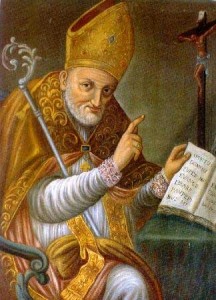 man who loved the Blessed Mother very much. His “Glories of Mary” is one of my favorite devotional books on the Blessed Virgin. He also wrote “Moral Theology”. He wrote it primarily based on his pastoral experience, as well as his education, which explains it’s ability to speak to us today. That pastoral experience, combined with his great prayer life, as well as his tremendous knowledge, made him such a wonderful confessor. What a heart this man had. He is a living example of how the journey can be made “from the head to the heart”. He is patron of Confessors and Theologians.
man who loved the Blessed Mother very much. His “Glories of Mary” is one of my favorite devotional books on the Blessed Virgin. He also wrote “Moral Theology”. He wrote it primarily based on his pastoral experience, as well as his education, which explains it’s ability to speak to us today. That pastoral experience, combined with his great prayer life, as well as his tremendous knowledge, made him such a wonderful confessor. What a heart this man had. He is a living example of how the journey can be made “from the head to the heart”. He is patron of Confessors and Theologians.
Petition to Mary by Saint Alphonsus Liguori
Most holy Virgin Immaculate, my Mother Mary,
to thee who art the Mother of my Lord,
the queen of the universe,
the advocate, the hope, the refuge of sinners,
I who am the most miserable of all sinners, have recourse this day.
I venerate thee, great queen,
and I thank thee for the many graces
thou has bestowed upon me even unto this day;
in particular for having delivered me from the hell
which I have so often deserved by my sins.
I love thee, most dear Lady;
and for the love I bear thee,
I promise to serve thee willingly forever
and to do what I can to make thee loved by others also.
I place in thee all my hopes for salvation;
accept me as thy servant
and shelter me under thy mantle,
thou who art the Mother of mercy.
And since thou art so powerful with God,
deliver me from all temptations,
or at least obtain for me the strength to overcome them until death.
From thee I implore a true love for Jesus Christ.
Through thee I hope to die a holy death.
My dear Mother,
by the love thou bearest to Almighty God,
I pray thee to assist me always,
but most of all at the last moment of my life.
Forsake me not then,
until thou shalt see me safe in heaven,
there to bless thee and sing of thy mercies through all eternity.
Such is my hope.
Amen.
Tags: blessed mother, confessor, glories of mary, moral theology, redemptorists, saint alphonsus
This entry was posted on Wednesday, August 1st, 2012 at 12:27 am
You can follow any responses to this entry through the RSS 2.0 feed.
VATICAN CITY, 30 MAR 2011 (VIS) – In this Wednesday’s general audience, celebrated in St Peter’s Square, the Pope spoke about St. Alphonsus Maria of Liguori, bishop, Doctor of the Church and “outstanding moral theologian and master of spiritual life”.“St. Alphonsus was born in 1696 to a rich and noble Neapolitan family”, and undertook a brilliant career as a lawyer, which he abandoned in order to become a priest in 1726.
The Holy Father explained that the saint “began his work of evangelisation and catechesis at the most humble levels of Neapolitan society, to whom he enjoyed preaching and whom he instructed in the basic truths of the faith”.
In 1732 he founded the religious congregation of the Holy Redeemer. Its members, “under the guidance of Alphonsus, were genuine itinerant missionaries, who travelled to the remotest villages exhorting conversion to the faith and perseverance in Christian life, above all by means of prayer”.
Benedict XVI recalled that St. Alphonsus died in 1787, was canonised in 1839 and declared a Doctor of the Church in 1871. This title was granted for a number of reasons. Firstly, for his valuable teachings in the field of moral theology, which accurately expressed Catholic doctrine and on account of which Pius XII proclaimed him as “patron of all confessors and moralists”.
“St. Alphonsus”, continued the Pope, “never tired of repeating that priests were a visible sign of the infinite mercy of God, Who pardons and illuminates the minds and hearts of sinners that they might convert and change their lives. In our age, in which there are clear signs of a loss of moral conscience and – it is necessary to note with some concern – a certain lack of respect for the Sacrament of Confession, the teaching of St. Alphonsus remains valid”. (more…)
Tags: doctor of the church, mercy of god, moral theologian, moral theology, sacrament of confession, st alphonsus, St. Alphonsus of Liguori
This entry was posted on Wednesday, August 1st, 2012 at 12:26 am
You can follow any responses to this entry through the RSS 2.0 feed.
Holy Mary
From “Saints Speak”:
From heaven, in his own words, St. Alphonsus speaks on how the intercession of Mary is necessary for our salvation and shares the process of reviewing ones conscience before holy repentance..
Holy Repentance
Tags: blessed virgin mary, Holy Mary, holy repentance, repentance, st. alphonsus liguori
This entry was posted on Wednesday, August 1st, 2012 at 12:02 am
You can follow any responses to this entry through the RSS 2.0 feed.
Episode 14- Regnum Novum: Bringing forth the New Evangelization through Catholic Social Teaching with Omar Gutierrez – Pope Pius XI and “QUADRAGESIMO ANNO” , Pope Pius XII and the Radio Addresses.
– Pope Pius XI and “QUADRAGESIMO ANNO” , Pope Pius XII and the Radio Addresses.
[powerpress]
We live at a very special time. The confluence of many things has brought forth the clear need to be able to articulate the Social Teaching of the Catholic Church in a way that is accessible and applicable. This is not to be an effort where high-minded theories are to be bandied about. Rather, this is a time of opportunity wherein we can apply the Social Doctrine to the concrete so as to bring about a New Kingdom, a Revolution. – Omar G.
Pope Pius XI (31 May 1857 – 10 February 1939), born Ambrogio Damiano Achille Ratti, was Pope from 6 February 1922, and sovereign of Vatican City from its creation as an independent state on 11 February 1929 until his death on 10 February 1939.  He issued numerous encyclicals including Quadragesimo Anno, highlighting capitalistic greed of international finance, and social justice issues, andQuas Primas, establishing the feast of Christ the King. He took as his papal motto, “Christ’s peace in Christ’s kingdom”.
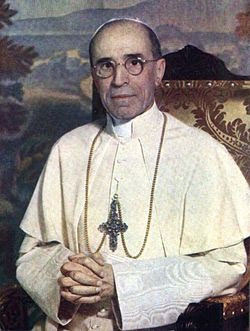 Venerable Pope Pius XII  born Eugenio Marìa Giuseppe Giovanni Pacelli (2 March 1876 – 9 October 1958), reigned as Pope, head of the Catholic Church and sovereign of Vatican City State, from 2 March 1939 until his death in 1958.
Venerable Pope Pius XII  born Eugenio Marìa Giuseppe Giovanni Pacelli (2 March 1876 – 9 October 1958), reigned as Pope, head of the Catholic Church and sovereign of Vatican City State, from 2 March 1939 until his death in 1958.
Also visit Omar’s “Discerning Hearts” page Catholic Social Teaching 101
Tags: catholic church, catholic social doctrine, catholic social teaching, papacy, Quadragesimo Anno, social doctrine
This entry was posted on Tuesday, July 31st, 2012 at 10:51 am
You can follow any responses to this entry through the RSS 2.0 feed.

